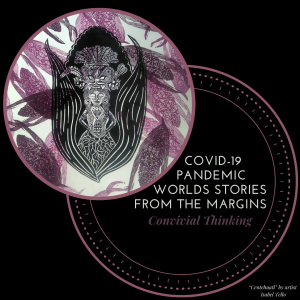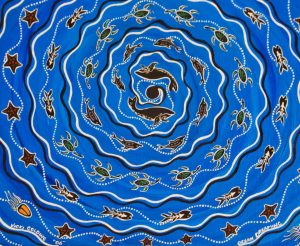by Wendy Harcourt
In her beautiful and widely circulated piece in Con Tactos, Judith Butler speaks of Human Traces on the Surfaces of the World asking us to consider deeply our interconnectedness:
“The virus lands on, enters, one bounded body and departs to land on the skin of another or on an object, looking for a host —the surface of a package, the porous material of a shared world” (21 April 2020).
The question is how can we share this world, as we all feel our vulnerability and our interconnectedness. How can we move beyond the deep multifaceted inequalities which are so starkly revealed in the pandemic and work towards maintaining communities that are based on care and respect for others diversity and our common responsibility for our shared life-worlds.
I left Australia over three decades ago because I was deeply uncomfortable at the erasures and violence that mark the Australian landscape and its people. I now find myself drawn back to consider what I can learn from Australian experiences of making ‘life-in-common’ across different world making practices as we consider this strange world of COVID-19.

I am deeply inspired by white Australian feminist philosopher Val Plumwood’s (2012) work on ecological/cross-species care. Plumwood’s term ‘Earthother’ invites us to re-imagine ourselves ecologically, understanding our connection with the world of animals, plants and minerals. I am also unlearning and relearning the Australian life world by listening and reading about Caring for Country where people and the land are one natureculture. As First Nations Professor of Law Irene Watson states: “First Nations’ relationships with the land makes us one with the natural world. Our lands and our natural world provide sustenance, enabling us to live and to develop our nations. Our ‘sung’ lands have defined our respective cultures, identities and existences as ‘Aboriginal Peoples’”.
Coming back to Australia over the decades I have seen the ongoing efforts to reappropriate, reconstruct and reinvent personal and political lifeworlds. They are part of a search for more ethical economic and ecological relationships in collective actions that challenge mainstream Australian politics and environmental policy.
I have been continually learning through conversations that on multiple levels are challenging and shifting the erasures and silences I lived with as a child. I have learnt about the historical violence towards Aboriginal Peoples on the ‘rotting frontier’ cut out of white Australian memory which ignored the knowledge of dreaming or the ‘Everywhen’ of aboriginal philosophy about many things in one, abidingness and sense of the order of the world which holds the present in place.
I recall vividly and painfully when I first encountered the term ‘Country’ back in the 1980s in a socialist feminist workshop in Brisbane. The event showed how little white Australian feminists understood the need to talk and acknowledge Country even if we engaged in saving wild rivers, ending uranium mining and acted in support of indigenous peoples’ sovereignty and land rights and protested against capitalist extractive destruction. The cultural divide was strikingly evident in the opening of the conference when hundreds of white women walked out of the forum when invited Turrbal women, the traditional owners of the land, took time to speak as a group in their own language and did not respect western time keeping. The visitors in their rush to leave in order to get on with their scheduled workshops, demonstrated an extraordinary lack of awareness and bodily acted out a racialized inequity that informs socio-cultural relations of white and indigenous Australia.
Then Caring for Country was not a term in everyday public use. Bawaka Country et al. (2013) describe how the notion of country encompasses and extends ideas of place and belonging. The authorship of Bawaka Country decentres human authors as the only sentient beings able to control and create and in doing so open up opportunities for reimaging and co-creating in how we write as well as how we can care for seas, lands, rivers, environment in a multispecies tangible and nontangible way that speak of connection, belonging, and affinity.
Underscoring these deep notions of Country as caring, nourishing, connecting, belonging spiritually and physically there are also the layers of colonial violence that have disrupted fundamental ways of centuries’ of living and Caring for Country. Conversations about Country are changing the political Australian landscape in defying the silence around past violence, opening up possibilities for different forms of social and ecological justice linking human and more than human relations and responsibilities. Such conversations interrogate racial privilege and colonial oppression. Caring for Country demands connections that reach across difference, colonial violence and racism as well as interspecies interactions.
Recognising our collective entanglements with Earthothers, trying to heal violent and troubling pasts, presents and futures is not a comfortable or easy position. We need to build our relational understanding of the connections among peoples, places and the environment, striving for racially and gender aware ecological practices.
As Irene Watson (2018) states:
“We need to listen to the natural world constantly; now it is changing, howling, raining and drying up. We need to continually monitor dangerous extractive industries which might damage our natural ecosystems. First Nations have never stopped watching and acting; the non-Indigenous world needs to learn how to reciprocate and share the responsibility we have to the natural world. Perhaps it begins with some deep listening to the Indigenous world”.

On my wall in my currently closed office in The Hague due to COVID-19, is an artwork by the Gamilarray/Kamilaroi indigenous artist Vicki Golding. Entitled ‘Ocean Dreaming’ it depicts circling sea creatures in a sea of blue. I have it on my wall because it speaks to me of community with Earthothers and the knowledge of life-worlds from which I need to learn. It depicts the possibility of a peaceful blue world far away from the UN/World Bank/ EU ‘blue economy’. Indeed it is time we start listening to those dreamings.
Wendy Harcourt is Professor of Gender, Diversity and Sustainable Development at the International Institute of Social Studies, Erasmus University in The Hague. Harcourt joined the ISS after 23 years at the Society for International Development in Rome as Editor of the journal Development and Director of Programmes. She has edited 10 books and her monograph: ‘Body Politics in Development: Critical Debates in Gender and Development’ published by Zed Books in 2009, received the 2010 Feminist Women Studies Association Book Prize. She is series editor of both the Palgrave Gender, Development and Social Change and the ISS-Routledge Series on Gender, Development and Sexuality, a member of the International Governing Council of the Society for International Development as well as actively involved in gender and development journal boards and civil society networks. She is also currently Coordinator of the EU H2020-MSCA-ITN-2017 Marie Sklodowska-Curie Innovative Training Networks (ITN) WEGO (Well-being, Ecology, Gender, and Community).
